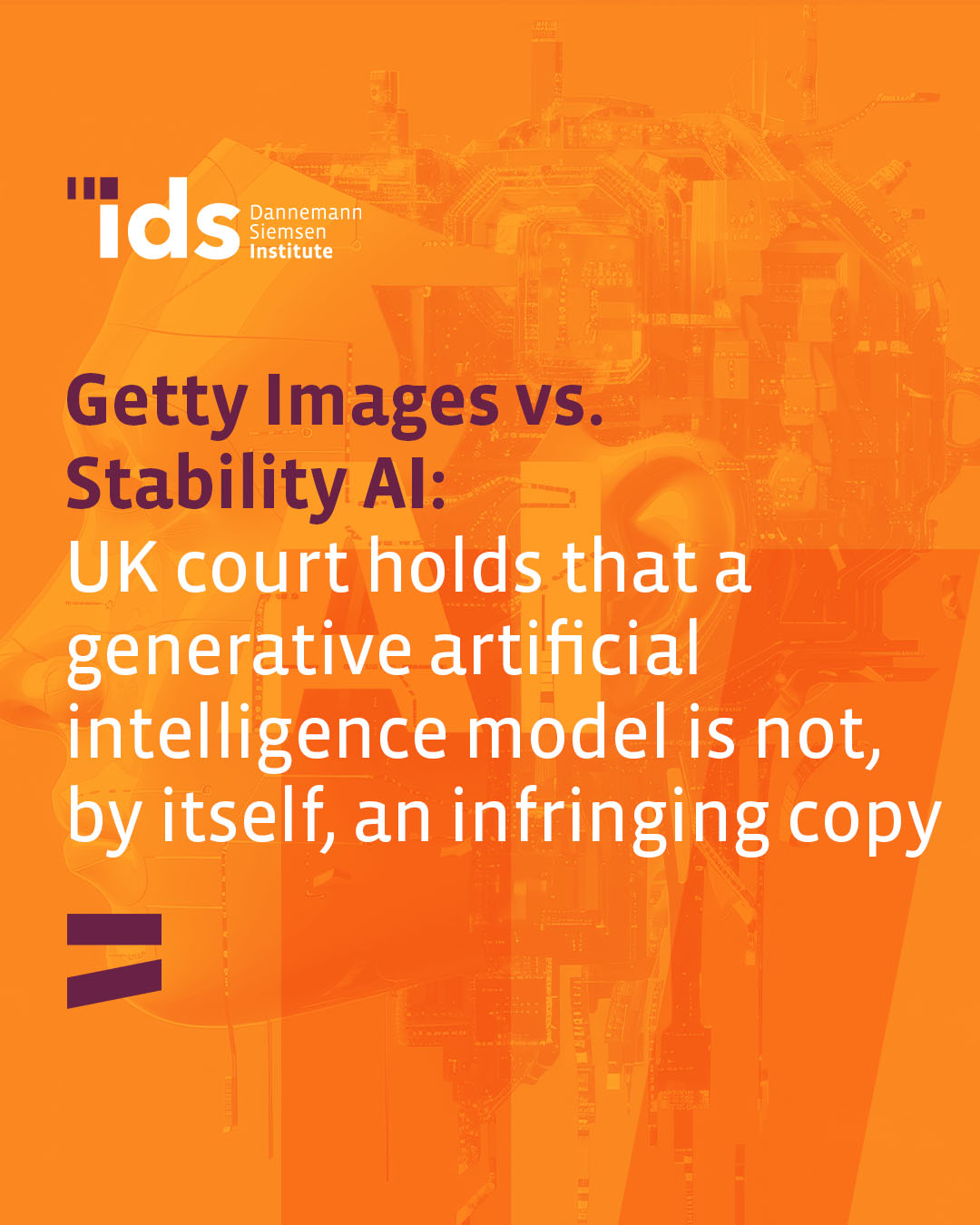11 de novembro de 2025
Share
Getty Images vs. Stability AI: UK court holds that a generative artificial intelligence model is not, by itself, an infringing copy
On November 4, 2025, the High Court of Justice of England and Wales, in the Intellectual Property Division (ChD), ruled that a generative artificial intelligence (AI) model does not, by itself, constitute an infringing copy of the works used in its training, even if the process involves the use of copyright-protected material. In ruling on the case, Justice Joanna Smith DBE dismissed the claim of secondary copyright infringement, concluding that an AI model that neither stores nor reproduces the original works cannot be regarded as an illegal copy.
The dispute began when Getty Images, a global image bank, sued Stability AI, the developer of the Stable Diffusion AI system, alleging the unauthorized use of millions of its photographs for model training. Getty Images filed lawsuits against Stability AI in several jurisdictions, including the United States and the United Kingdom, but the UK court’s decision was the first to be handed down on the matter.
The UK judgment addressed fewer issues than expected, as Getty Images dropped some of its initial claims, including copyright infringement during the training and development of the AI — having acknowledged that the training took place outside the UK — copyright infringement in the image generation (output) phase, and violation of database rights.
Accordingly, the dispute centered primarily on two key issues: (i) the alleged trademark infringement and (ii) the alleged secondary copyright infringement, which examined whether the AI model itself could be considered an infringing copy.
In her concluding remarks, Justice Joanna Smith stated that, although Getty Images had achieved partial success in its trademark infringement claim, her findings were both historic and extremely limited in scope. As for the allegation of secondary copyright infringement, the justice found it to be unfounded.
Regarding the trademark infringement claim, Getty argued that users of the Stable Diffusion model in the UK were generating synthetic images containing reproductions of its watermarks, thereby constituting trademark infringement. In response, the defendant denied liability, asserting that any watermarks appearing in the outputs resulted from user actions, since users control the generation process through prompts. The company also sought to show that this issue was historically linked to older versions of the model and that there was no evidence that newer versions continued to generate such marks.
The Court accepted that the latest versions of the AI model no longer presented the watermark problem but rejected the argument that Stability AI had no control over the outputs. It recognized that, while users do exercise some control, it is only partial, as the generated content depends directly on the training data determined by the company. Consequently, the justice concluded that the defendant was only responsible for the unintentional generation of watermarks in earlier versions of the AI model, constituting infringement under Sections 10(1) and 10(2) of the Trade Marks Act.
As for the claim of secondary copyright infringement, Getty Images focused on the training process of the defendant’s AI model, arguing that it was only possible because it involved prior reproduction of copyright-protected works. Its argument relied on Section 27(3) of the Copyright, Designs and Patents Act (CDPA), which governs copyright law in the United Kingdom. This provision establishes that an object—referred to as an “article”—even if created outside the UK and later imported, may be classified as an “infringing copy” if its method of manufacture involved a direct copyright violation. Based on this, the claimant contended that Stable Diffusion, although intangible, fits within the definition of an “article” and that, even without storing the allegedly infringed images, the model is the product of an infringing process. Therefore, by importing, possessing, or distributing the model in the UK, Stability AI would be committing secondary copyright infringement.
The defendant, in turn, argued that the term “article” under UK law refers solely to tangible objects and therefore cannot apply to an AI model, which is intangible. Moreover, it maintained that even if the model were considered an “article,” it could not be classified as an infringing copy since it neither contains nor stores reproductions of the images used in training. Stability AI contended that Stable Diffusion merely reflects the system’s learned patterns rather than any direct reproduction of the protected works and therefore does not infringe copyright.
The justice accepted that a digital model may, in principle, qualify as an “article” for legal purposes. However, she established a decisive criterion: for an article to be deemed an infringing copy, it must actually contain a copy of the protected work. Since Stable Diffusion merely learns patterns and neither stores nor reproduces the original images, the court concluded that the model does not constitute an illegal copy, thereby rejecting the claim of secondary copyright infringement.
In conclusion, the judgment represented a partial victory for Getty Images, limited to trademark infringement in earlier versions of the model, and a substantial victory for Stability AI regarding the copyright claims. Furthermore, the ruling sets an important precedent by affirming that, under current UK law, a generative AI model is not an infringing copy of the works used in its training. The decision is subject to appeal.
The decision may be accessed at the following link: Getty Images (US) Inc & Ors v Stability AI Ltd (Rev1) [2025] EWHC 2863 (Ch) (04 November 2025)
Note: For quick release, this English version is provided by automated translation without human review.
